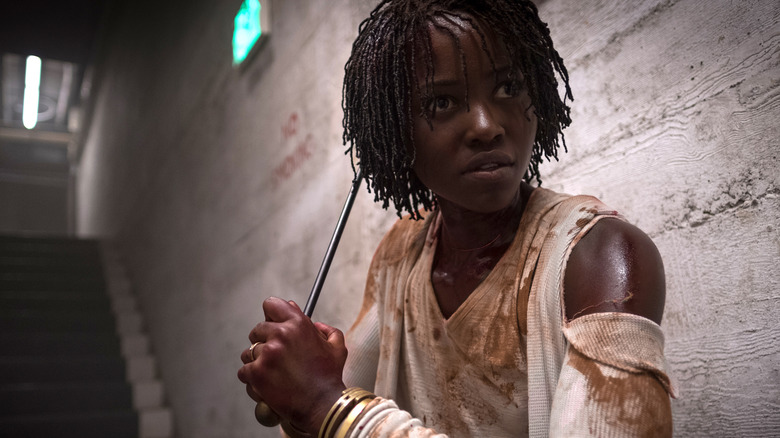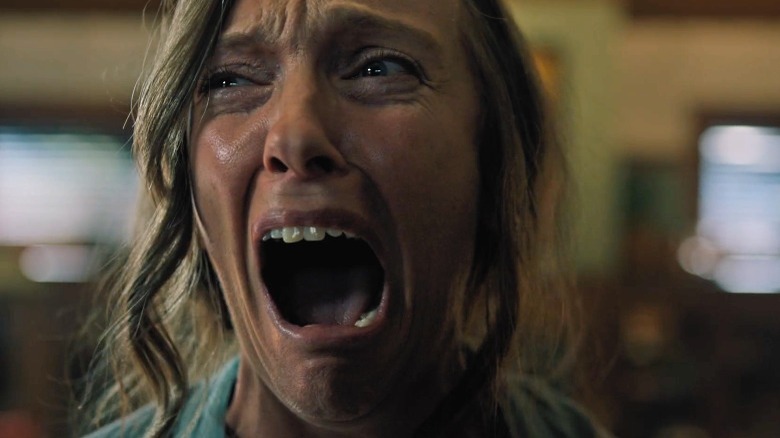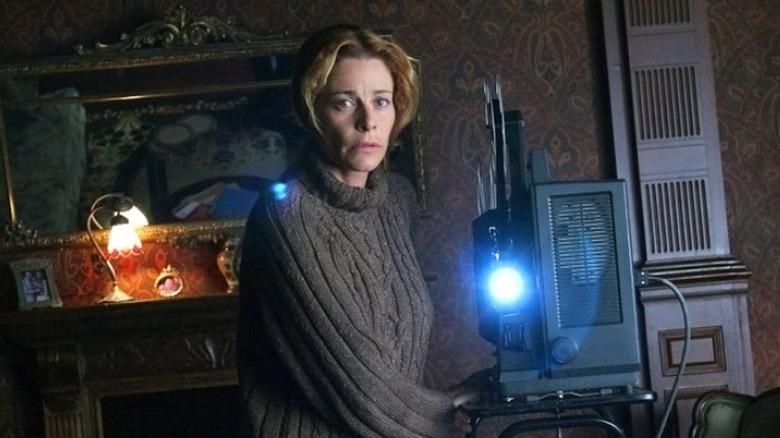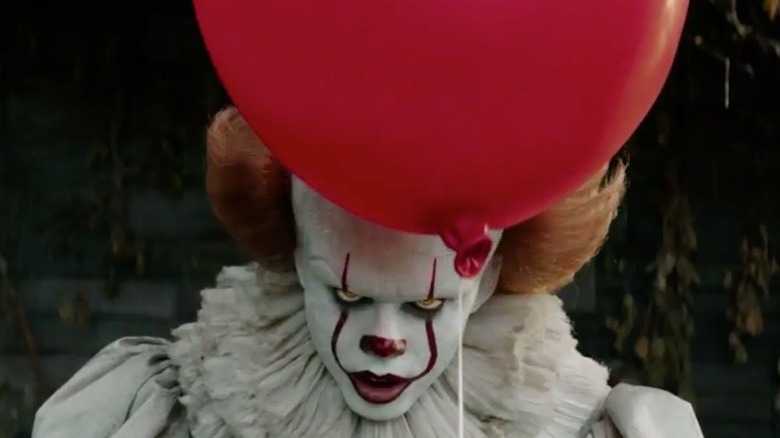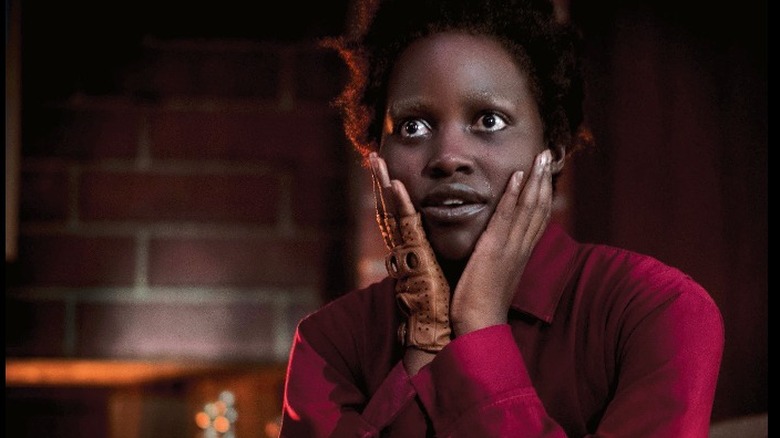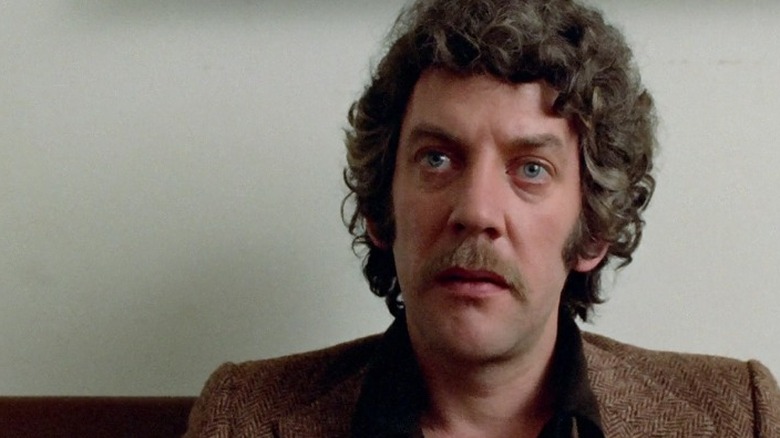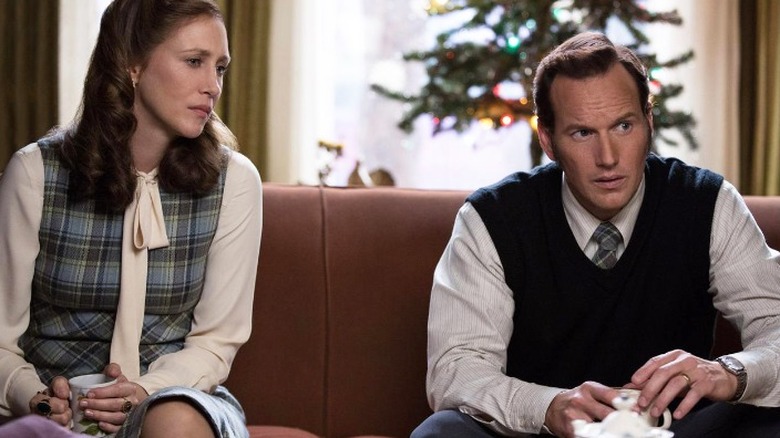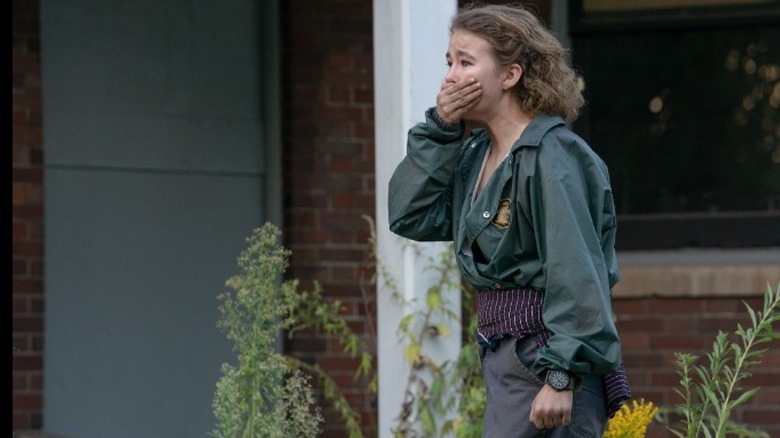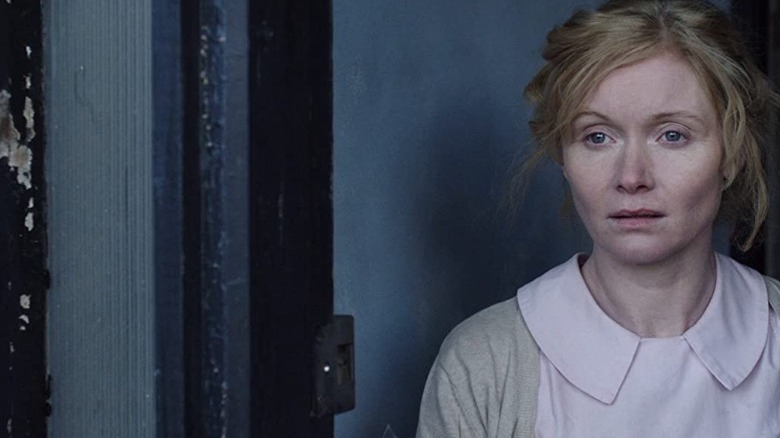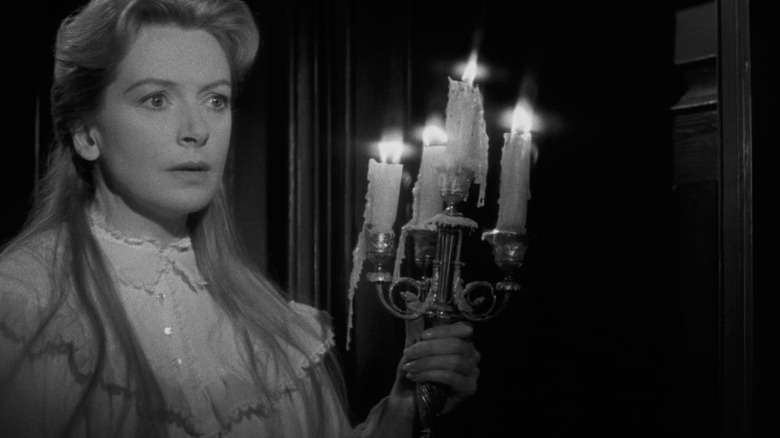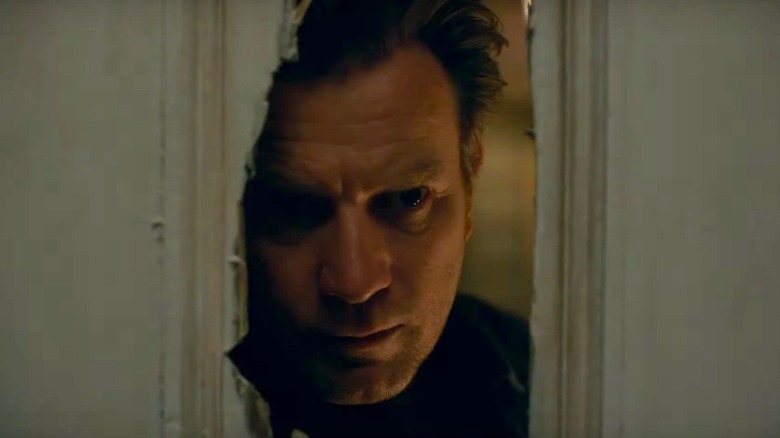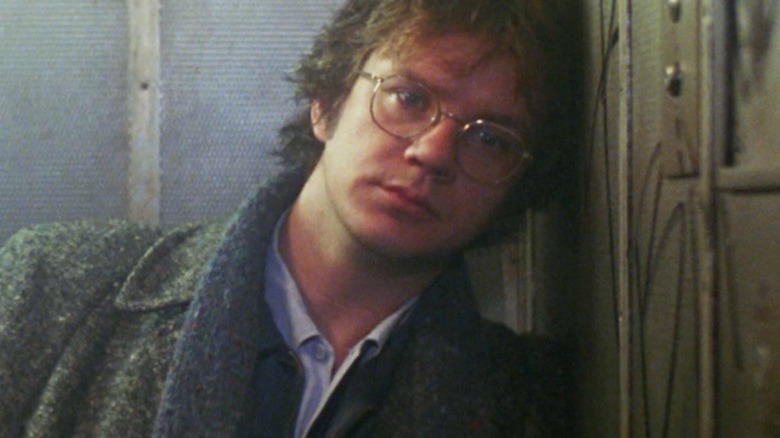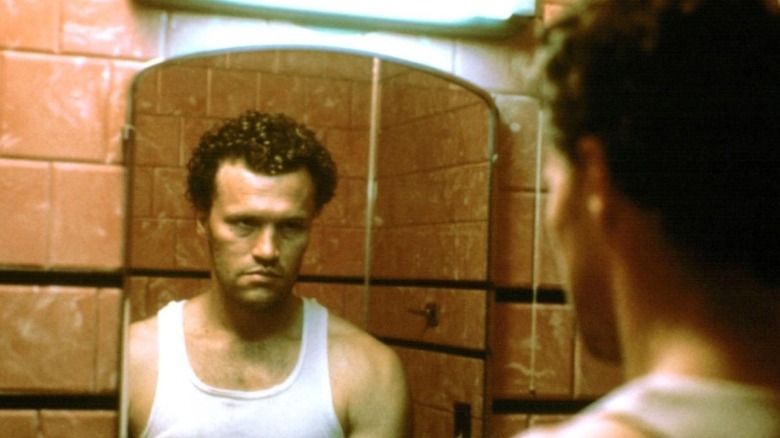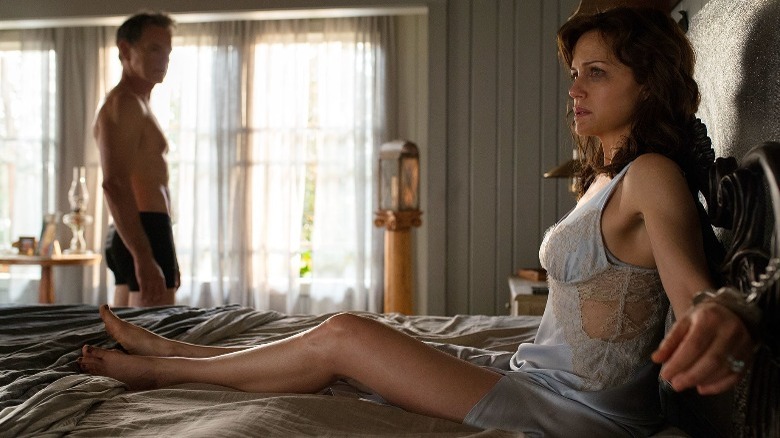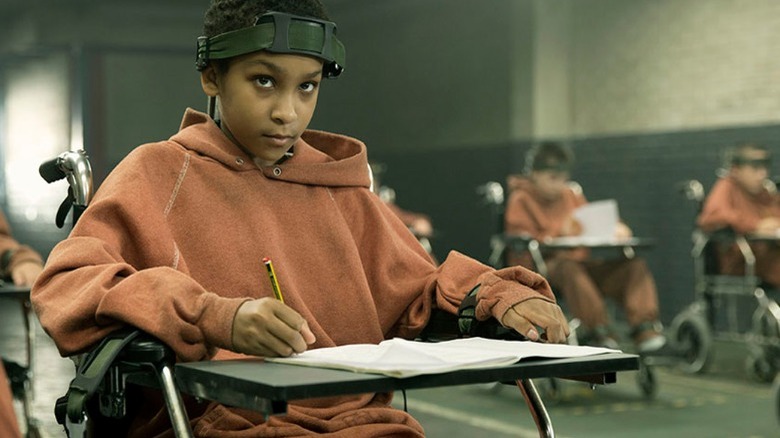The 14 Best Horror Movie Performances That Should Have Won Oscars
The idea that the Academy of Motion Pictures Arts and Sciences routinely ignores the exceptional work being done in the horror genre is more than just anecdotal. During the entirety of its existence, only six horror movies have been nominated for the ceremony's top honor, with only one, Jonathan Demme's "The Silence of the Lambs," winning. Sure, contemporary superhero fans bemoan the Academy's big-budget, blockbuster blind spot, but the horror genre is a historic form, with the contemporary superhero genre only coming into its own fairly recently.
More important is just how tailor-made the genre is to gangbusters awards-worthy performances. While a few lucky contenders break through — including Daniel Kaluuya most recently for his fantastic performance in Jordan Peele's "Get Out" — more often than not, transcendent or profound performances are ignored altogether. In a genre that runs the entire gamut of emotions, it's no surprise the best horror is anchored by stellar performances. Here, we'll be recounting 14 horror movie performances that were arguably deserving of an Oscar nom (ranked), starting with modern history's most famous example.
14. Toni Collette in "Hereditary"
At the 91st Academy Awards, the ceremony where Toni Collette's performance as Annie Graham in "Hereditary" would have been eligible, Olivia Colman secured the top honor for her work in Yorgos Lanthimos' "The Favourite." It's a deserving win, though it highlights the horror bias almost innate in the Academy itself. Colman's work wasn't all that different than Collette's. Both were frenetic, howling, unencumbered portraits of women in a spiral. The only difference is that one was attached to a subversive period piece, while the other was a horror movie.
Collette's work as Annie Graham, a grieving mother whose family just might be in the midst of an occult takeover, is truly off the charts incredible. She is simultaneously empathetic and terrifying, a delicate tonal balance that owes as much to Ari Aster's script as it does Collette's lived-in performance, one that features a cognizance of never leaning too far in either direction. Few viewers could see Collette's climactic meltdown at the dinner table and argue, with any good faith, that she didn't deserve at least a nomination. After all, Collette is one of the lucky few to secure a nomination for work in a horror movie. Two decades prior, Collette secured a nomination for her role in M. Night Shyamalan's "The Sixth Sense."
13. Belén Rueda in "The Orphanage"
Belén Rueda has been a consistently underrated performer, in part because her best work is either outright horror or genre adjacent. Her Goya-winning performance in "The Sea Inside" is perhaps her most famous work, though Rueda's complete, unqualified understanding of character is what renders movies like "Julia's Eyes" and "The Body" so successful. Whether empathetic protagonist or scheming villain, Rueda is inimitably engaging.
There's little chance Rueda, had she been nominated for her work in Juan Antonio Bayona's "The Orphanage," would have won at the 80th Oscar Ceremony. That year, the best actress honor went to Marion Cotillard for "La Vie En Rose" and, come on, that performance is the stuff of legend. Still, Rueda deserved a fair shot for her performance as Laura García Rodríguez in Bayona's gothic haunter. Endeavoring to start an orphanage for sick children, her life unravels after the disappearance of her son, Simón (Roger Príncep), an event that coincides with the appearance of a sack-hooded apparition. It's one of the genre's most heartbreaking performances, a profoundly proactive portrait of grief and terror that more than deserved a nomination.
12. Bill Skarsgård in "It: Chapter One"
One of the wisest decisions Andy Muschietti made in his adaptation of Stephen King's seminal, considerably long novel "It" was restructuring Pennywise's mythos and appearance to distance it as much from Tim Curry's noteworthy performance in Tommy Lee Wallace's television adaptation from 1990. Curry's performance is iconic, objectively accounting for the best moments in Wallace's two-parter.
Conversely, Bill Skarsgård's Pennywise the Dancing Clown is considerably more renaissance. He's lithe and playful, a stark contrast to Curry's party store fare. While Curry fits the modern conception of what a clown is, Skarsgård adroitly taps into the darker undercurrent, crafting a Pennywise that's as devilishly fun as he is malicious. That year, Gary Oldman won the golden statue for his stunningly transformative role in "The Darkest Hour," a well-deserved win. Still, the Academy could reasonably have nominated Skarsgård for a similarly transformative portrayal. Like Curry before him, his Pennywise is easily the best thing about "It: Chapter One," and as good as that movie is, that's saying something.
11. Lupita Nyong'o in "Us"
No different than Toni Collette's role in "Hereditary," there was genuine, hopeful speculation that Lupita Nyong'o, already an Oscar winner for her work in "12 Years a Slave," would at least earn a nomination for her groundbreaking dual-performance in Jordan Peele's "Us." That hope was quickly squashed when nominations were announced, though a deserved Renée Zellweger, back on top, won for her incredible work in "Judy."
Imagine how sensational it would have been, though, had both Nyong'o and Collette been nominated for their work in genre fare in two consecutive years. Better still, both performances are different subversions of conventional maternal tropes, with Collette on one end, ostensibly a callous and frightening mother, with Nyong'o on the other, playing not just one, but two versions of herself, both of whom are principally motivated to act out of loyalty to their families. Nyong'o is easily what tethers (see what we did there?) the best parts of Peele's "Us" together, adopting a raspy, croaky voice for her other self, one that never feels at all similar to her other character.
10. Donald Sutherland in "Don't Look Now"
Anyone who's seen "Ordinary People" can attest that it ranks among Donald Sutherland's best work. As the husband to Mary Tyler Moore's Beth and father to Timothy Hutton's Conrad, he's the Jarrett family's key figure, the lone enterprise holding oppositional sides together. It's a profound, deeply tragic performance, and it went without recognition at the Oscar ceremony that year, despite nominations for co-stars Moore, Hutton, and Judd Hirsch.
Sutherland was likely familiar with the sting of being overlooked, especially after the Academy failed to recognize his similarly tragic turn in Nicolas Roeg's "Don't Look Now," adapted from the inimitable Daphne du Maurier's short story. Likely out of the running by default on account of "Don't Look Now's" protracted, graphic sex scene between himself and Julie Christie, Sutherland belies genre tropes. In fact, both he and Christie would have been worthwhile contenders in their respective categories, mining the deep wells of grief better than most Oscar contenders could only dream of.
9. Vera Farmiga and Patrick Wilson in "The Conjuring 2"
This one might appear to be cheating, but it isn't. While Vera Farmiga and Patrick Wilson excel at playing real-life paranormal investigators Lorraine and Ed Warren in James Wan's seminal 2013 ghost story "The Conjuring," Wan's follow-up comes with a hefty 134-minute runtime, most of which is dedicated to better fleshing out the central ghostbusters. Resultantly, "The Conjuring 2" is a deeply personal piece of work, one as much concerned with spine-tingling scares as it is with the relationship between Lorraine and Ed and the toll spectral investigations have had on them.
The two work in tandem, each augmenting the others' performance. There's genuine tenderness and intensity, with Wilson playing Ed as a good guy simply trying to do good, with Farmiga leaning further into Lorraine's intractable spirit. The flagship "Conjuring" movies remain the most successful films within the Conjuring Cinematic Universe on account of the Warrens. Even beyond the world of horror, there are few filmic couples quite like them.
8. Millicent Simmonds in "A Quiet Place: Part II"
Much like "The Conjuring 2," director John Krasinski's follow-up to his surprise 2018 hit "A Quiet Place" opts for more than just a bigger scale and budget. Instead, he shifts the focus to Millicent Simmonds' returning character Regan Abbott, the family's deaf daughter. Still grieving the loss of her father, and bearing responsibility that isn't hers, she leads the charge in Krasinski's sequel, going off on her own and eventually teaming up with newcomer Emmett (Cillian Murphy) to find a safe haven for her and her family.
Simmonds is more than equipped to tap into the pressures of accelerated adulthood, conveying a delicate balance of resolve, maturity, and vulnerability. Speaking with SyfyWire, Simmonds herself noted that ASL and deafness were inherently linked to her character's heroism, and it's a tour-de-force performance, one that taps into long-needed on-screen representation while culling from the classics. With elements of Ellen Ripley and Sarah Connor, Simmonds' Regan is a horror hero to be reckoned with. With 2022's nomination of Troy Kotsur for his work in "CODA" representing only the second time a deaf actor has been nominated for their work, a nomination for Simmonds would have meant more than most.
7. Essie Davis in "The Babadook"
Jennifer Kent's directorial debut is awe-inspiring. Though it existed in form and feeling before, "The Babadook" is arguably responsible for the contemporary wave of "elevated" horror. That is, horror that eschews genre convention for grounded themes and atmosphere over meeting audience expectations. Of course, horror fans know the genre has always done that, and so-called "elevated horror" is just a thinly veiled attempt to denigrate the rest of the genre. "The Babadook" is the real deal, though it has less to do with the titular haunting Babadook than one might think.
Essie Davis stars as Amelia Vakan, a widow living with her young son Samuel (Noah Wiseman), her husband (and Samuel's father) having been killed years earlier in an auto accident as Amelia was in labor. Samuel's behavior grows more troubling as he has frequent violent outbursts, an event that coincides with an imaginary monster from a storybook: The Babadook. Davis is, quite simply, sensational, and had "The Babadook" not been a genre property Davis would not only have been nominated, but she'd also likely have won.
6. Deborah Kerr in "The Innocents"
Henry James' "The Turn of the Screw" is one of the preeminent gothic ghost stories. Coming in at novella-length, it's perfectly paced, deeply atmospheric, abounding with rich themes, and — above all else — it's scary as hell. A perennial for adaptations, including radio shows, plays, television series (including Mike Flanagan's recent "The Haunting of Bly Manor"), and movies, Jack Clayton's 1961 "The Innocents" remains the best version.
Six-time nominee and Honorary Oscar-winner Deborah Kerr stars as Miss Giddens, a governess hired to care for two young children, Miles (Martin Stephens) and Flora (Pamela Franklin), at their uncle's (Michael Redgrave) estate called Bly. Once there, she suspects the ghosts of two previous Bly workers not only haunt the grounds but also yield profound influence over Miles' and Flora's behavior, circumstances that send her spiraling. Kerr, by dint of her film legacy, is incredible, creating the most complex and fragile portrayal of the Governess seen in any adaptation. It's dense, rich, and shifts effortlessly from empathetic to frightening on its own terms. Sophia Loren won the Oscar that year, and curiously Kerr herself was nominated the year before.
5. Ewan McGregor in "Doctor Sleep"
Mike Flanagan's "Doctor Sleep" is criminally underrated. With a reported budget of $45 million and a total box office tally just shy of $73 million, Flanagan's adaption of Stephen King's own sequel to "The Shining" failed to scare up much money when released in November 2019. It's a shame, because "Doctor Sleep" isn't just some of Flanagan's best work or one of the best King adaptations in recent memory ... it's one of the strongest horror movies released in the past decade.
A huge part of that is credited to Ewan McGregor's work as Danny Torrance, the now grown-up version of the same little "Come and play with us, Danny" sap from Kubrick's original adaptation. An alcoholic grappling with his father's death and the goings-on at the Overlook hotel, he nonetheless maintains his "shining," the psychic essence the alcohol helps to suppress. "Doctor Sleep" and McGregor do what horror does best, using scares as a springboard for thematic poignancy. McGregor is heartbreaking in the role, effortlessly shifting from denial to full-bore strength when he realizes his own abilities might help to keep another little girl alive. That year, Joaquin Phoenix would win the golden statue for his work in "Joker," and no one is arguing he shouldn't have. Still, McGregor has long been ignored, and "Doctor Sleep" would have been the perfect launching pad for a future career of awards recognition.
4. Tim Robbins in "Jacob's Ladder"
Adrian Lyne's "Jacob's Ladder" is a strange movie. After serving in Vietnam, Jacob Singer (Tim Robbins) finds himself plagued by terrifying hallucinations and fractured visions of his time there. There are demons at parties, tentacles in the subway, and even psychic premonitions telling Jacob he's already died. Spliced together with odd, dreamlike flashbacks to his service, "Jacob's Ladder" is an obtuse horror fan's dream. It's also very good, benefiting in equal measure from Lyne's stylish direction and Robbins' sensational performance.
Much like Essie Davis in "The Babadook," Robbins would likely have been nominated for his work here had the horror elements been dialed back. Horror is the Academy's kryptonite, and no matter how sensational his work here was, the moment a tentacle sprouted out of a homeless man's body the Academy likely immediately wrote it off. It's a shame, especially given how his work here is an early precursor to his role in "Mystic River," the movie that secured Robbins the Oscar for best supporting actor. Still, "Jacob's Ladder" endures as one of the '90s most unsung horror gems.
3. Michael Rooker in "Henry: Portrait of a Serial Killer"
Charlize Theron won a well-deserved Oscar for her portrayal of Aileen Wuornos in Patty Jenkins' "Monster," demonstrating that the Academy isn't entirely opposed to rewarding actors for their portrayals of serial killers. A terrifyingly transgressive performance is still, writ large, a good performance. It's curious that nearly two decades before Michael Rooker walked away empty-handed for his groundbreaking work in John McNaughton's "Henry: Portrait of a Serial Killer."
Well, it's not all that curious. "Henry: Portrait of a Serial Killer" is considerably more graphic than "Monster," and more austere. It's grim, dour stuff, and while an Aileen Wuornos biopic isn't exactly easy stuff, it's still more palatable with its larger budget and pedigree talent behind it. "Henry: Portrait of a Serial Killer" has none of that, but Rooker's portrayal as a portmanteau of real-life serial killer Henry Lee Lucas and others is enduringly chilling. It's raw, lived-in, and ranks among one of the scariest screen portrayals ever seen.
2. Carla Gugino in "Gerald's Game"
Stephen King's novel "Gerald's Game" was released in 1992, and it took 25 years before it was adapted into cinematic form. A large part of that rests on the structure of the plot itself. A woman's husband dies of a heart attack while she's handcuffed to a bed, and from there — fearing she has little hope of being rescued — her sanity slips. A prime example of a conceit uniquely tailored to the written word, it seemed nearly impossible to do the source material justice. Then Mike Flanagan, alongside a sensational Carla Gugino in the lead role, managed to do just that.
It cannot be overstated just how incredible Gugino is. With the entirety of the movie resting on her, she more than commits, exhibiting Jessie's strength and fear in equal measure, ensuring the audience never quite knows what she intends to do next. It's the kind of rapturous performance that, in years past, would have all-but-cemented an Oscar nom, though perhaps by dint of its Netflix distribution or genre qualification ("Gerald's Game" is as grim and graphic as horror gets), Gugino was shut out. With the actress having something of a career resurgence in recent years, it's worth checking out where it all began.
1. Sennia Nanua in "The Girl with All the Gifts"
Sometimes you go into a movie fairly blind. There are some recognizable variables — an actor you might know or a source material you're somewhat familiar with — but other than that, it's unfamiliar terrain. Colm McCarthy's "The Girl with All the Gifts" is one such movie, though don't let unfamiliarity deter you: This film is the real deal.
The best thing about it is relative unknown Sennia Nanua's portrayal of Melanie, one of several second-generation "hungries," the movie's version of parasitic zombies. Hungries still consume human flesh, but they're also remarkably human, capable of speech, learning, and even empathy with other humans. Given Melanie's remarkable gifts (hence the title), she is swiftly identified as yielding the key to humanity's survival. Nanua's grounded performance is unpredictable, both tender where it counts and terrifying in Melanie's more primal urges. It's complex stuff, especially from a performer of her age, and it's without a doubt the best thing about "The Girl with All the Gifts." Child performers often make or break their respective debuts, and on account of Nanua, "The Girl with All the Gifts" is a gift indeed.
